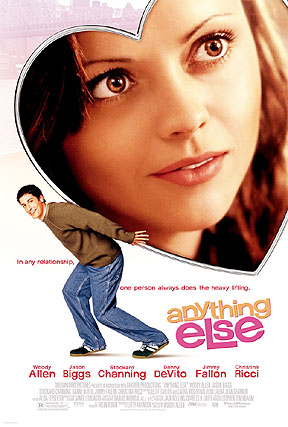
ANYTHING ELSE
US, 2003, 108 minutes, Colour.
Woody Allen, Jason Biggs, Stockard Channing, Danny de Vito, Christina Ricci, Jimmy Fallon, Fisher Stevens.
Directed by Woody Allen.
After his success with Deconstructing Harry (and an Oscar nomination for screenplay), critics considered that Woody Allen went into something of a slump. This, of course, is interpretation. In fact the next three films were critically well received: Celebrity, Sweet and Lowdown, Small-time Crooks. With The Curse of the Jade Scorpion, there was limited release and, even more so, with his 2003 opening film for the Canned Film Festival, Hollywood Ending.
With Anything Else, it could be seen that Woody Allen was back in form, at least with very funny dialogue. The story is fairly trite, a young man and his infatuation with an erratic young woman (and her even more erratic mother moving in). Jason Biggs, better known for his role in the American Pie films, acquits himself quite well as the alter-younger ego of the Woody Allen type. He has the same wisecracks - but his delivery is more plain, perhaps a little more mundane, than that of Allen himself. Christina Ritchie plays the young girl and Stockard Channing enjoys herself as her mother. Danny de Vito has some good scenes as an avaricious agent. However, Woody Allen is at his best in a most unusual role. He is the mentor for Jason Biggs. They both are comedy writers. Allen is also a teacher. However, he often meets Biggs in the park, they have conversations, he gives advice and acts as a mentor not only in writing but in life. Soon the conversations move to Jewish issues - something stronger and perhaps rather new for Allen himself to be so explicit. Since the film was made after September 11, 2001, there are discussions about terrorism, about survival kits. It is hard to know whether this is Woody Allen's own personal paranoia or whether he is sending it up.
The title of the film comes from sayings when people talk about all the hard things in life, a taxi driver says that it is just like anything else.
1. An enjoyable Woody Allen comedy? Romance? Woody Allen, older, wiser, the mentor? The title and the taxi driver's response? Problems and they are like anything else?
2. The visuals of Woody Allen's New York, Central Park, the apartments, restaurants, theatre? The journey to New Jersey and the gun shop by way of contrast?
3. The musical background, Woody Allen's love of jazz? The songs: "Easy to Love", "Just the Way You Look Tonight"? Billie Holliday singing? The nightclub ballad, Paula's ballad?
4. Woody Allen's verbal humour, the jokes at the start of the film, his advising Jerry to think about it? The quality of the one-liners as delivered by Woody Allen and Jason Biggs? The emphasis on Jewish themes, the memory of the Holocaust, religious and atheistic Jews? Atheism and religion? Persecuted minority?
5. Woody Allen and his age, the forty years difference between Woody Allen and Jason Biggs? Jason Biggs as his mouthpiece, the different intonations? Dobel as a teacher, writer, success? His paranoia, the details of the survival kit and the reasons for it? The guns, the visiting the shop in New Jersey, the explanation of the guns, the guns in Jerry's house, Amanda and her reaction? The survival kit? The Jewish issues? Dobel as quiet, meek, waiting for the parking spot, its being taken, his going off, Jerry's response, his returning and smashing the windows? His being an adviser and mentor to Jerry, Jerry as his alter-ego? The story that he told at the end about going back to shoot people - true, merely a device to get Jerry to stand on his own feet?
6. Jerry, in himself, ordinary, young, his marriage and divorce, the flashbacks and his girlfriend, the dinner with Amanda and her boyfriend, the talk, his agreeing with everything, his being attentive to her, the return home, the clash with his girlfriend, his inability to break things off and not wanting to hurt people? The moving in with Amanda? His doing the voice-over, his looking at the audience, inviting them into his confidence? The early relationship, friendship, sexual relationship? Six months passing, his talking to Dobel, listening to the stories? His becoming suspicious of Amanda, listening to her stories, taking her to the doctor? Her wanting her mother to move in and the manipulative way in which she arranged it? His talking with Paula? Dobel fostering his suspicions of Amanda, his spying on her, following her, seeing her with the drama teacher, the confrontation? His not suspecting the doctor?
7. Amanda, age, experience, lack of commitment? When seeing Paula, it being easy to understand Amanda's behaviour and attitudes? Erratic, breaking with her boyfriend, flirting with Jerry? Moving in with him? Kissing, sexuality? Her auditions, her girlfriend? An actress? Her changes of moods, her not being able to tell the truth to Jerry? With the teacher, the doctor's visit? The confrontation with her mother?
8. Paula and her background, her incessant chatter, commanding everybody, taking up the house, moving the piano in, interfering with Jerry's creativity? Her outings, her song at the piano, wanting Jerry to write material for her performance? Bringing home the boyfriend?
9. Harvey as the agent, waiting with Jerry, Dobel seeing him, taking a dislike to him, Jerry being his only client, the discussions, the meals, the arguments, the plans? The phone call, Harvey and his late arrival, his wanting the contract signed again, Jerry breaking the news, Harvey's collapse - but surviving?
10. Jerry and the experience of Amanda's disloyalty and lies? The decision to go to California? The big break, contact with his mother? The final decision, going to the school to pick up Dobel, Dobel not wanting to go? His changing his mind, the story? Jerry driving away - and glimpsing Amanda and the doctor?
11. An entertaining blend of romance with irony?